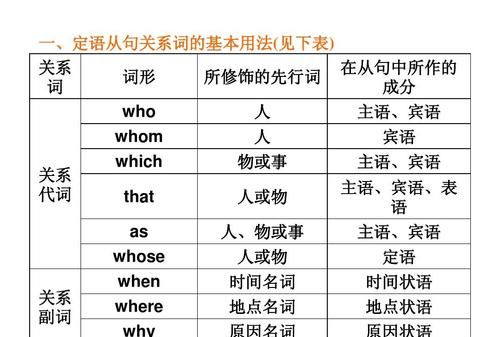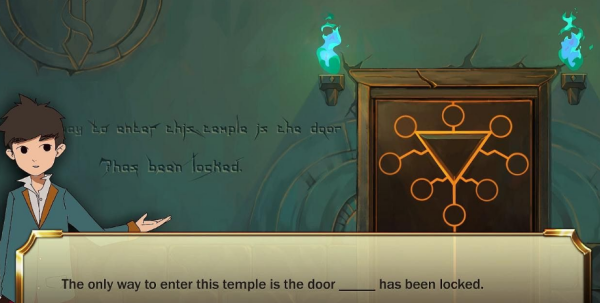本文目录
定语从句有哪些
(一)定语从句的类型
定语从句(Attributive Clauses)在句中做定语,修饰一个名词或代词,被修饰的名词,词组或代词即先行词。定语从句通常出现在先行词之后,由关系词(关系代词或关系副词)引出。 关系代词有:who, whom, whose, that, which等。 关系副词有:when, where, why等。
一、 限定性定语从句
1. that即可代表事物也可代表人,which代表事物;它们在从句中作主语或宾语,that在从句中作宾语时常可省略关系词,which在从句中作宾语则不能省略。而且,如果which在从句中作“不及物动词+介词”的介词的宾语,注意介词不要丢掉,而且介词总是放在关系代词which的前边,但有的则放在它原来的位置
2. which作宾语时,根据先行词与定语从句之间的语义关系,先行词与which之间的介词不能丢
3. 代表物时多用which,但在带有下列词的句子中用that而不用which,这些词包括all, anything, much等,这时的that常被省略
4. who和whom引导的从句用来修饰人,分别作从句中的主语和宾语,whom作宾语时,要注意它可以作动词的宾语也可以作介词的宾语
5. where是关系副词,用来表示地点的定语从句
6. when引导定语从句表示时间
[注]值得一提的是,表示时间“time"一词的定语从句只用when引导,有时不用任何关系代词,当然也不用that引导
By the time you arrive in London, we will have stayed there for two weeks.
I still remember the first time I met her.
Each time he goes to besiness trip, he brings a lot of living necessities, such as towers, soap, toothbrush etc.
7. whose是关系代词,修饰名词作定语,相当于所修饰成分的前置所有格
8. 当从句的逻辑主语是some, any, no, somebody, anybody, nobody, something, anything, everything或nothing时,常用there is来引导
二、非限定性定语从句:
非限定性定语从句的作用是对所修饰的成分作进一步说明,通常和主句间用逗号隔开,将从句拿掉后其他部分仍可成立
1. which引导的非限定性定语从句来说明前面整个句子的情况或主句的某一部分
2. 在引导限定性定语从句时,that有时相当于in which, at which, for which或at which
Attitudes towards daydreaming are changing in much the same way that(in which) attitudes towards night dreaming have changed. 人们对白日做梦的态度正在改变,这与人们对夜间做梦的看法的变化有非常相似之处。
I like the music for the very reason that(for which) he dislike it. 我出于某种原因喜欢这种音乐,而他恰恰与我相反。
We arrived the day that(on which) they left. 刚好我们到的那天他们走了。
3. 有时as也可用作关系代词
4. 在非限定性定语从句中,不能用that,而用who, whom代表人,用which代表事物.
一.定语从句及相关术语
1.定语从句:修饰一个名词或代词的从句称为定语从句,一般紧跟在它所修饰的先行词后面。
2.关系词:引导定语从句的关联词成为关系词
关系词有关系代词和关系副词。关系代词有that, which, who, whom, whose, as等;关系副词有where, when, why等。
关系词常有3个作用:1,引导定语从句。2,代替先行词。3,在定语从句中担当一个成分。
二.关系代词引导的定语从句
1.who指人,在从句中做主语
(1) The boys who are playing football are from Class One.
(2) Yesterday I helped an old man who lost his way.
2. whom指人,在定语从句中充当宾语,常可省略。
(1) Mr. Liu is the person (whom) you talked about on the bus.
(2) Mr. Ling is just the boy whom I want to see.
注意:关系代词whom在口语和非正式语体中常用who代替, 可省略。
(3) The man who/whom you met just now is my friend.
3. which指物,在定语从句中做主语或者宾语,做宾语时可省略
(1) Football is a game which is liked by most boys.
(2) This is the pen (which) he bought yesterday.
4. that指人时,相当于who或者whom;指物时,相当于which。在宾语从句中做主语或者宾语,做宾语时可省略。
(5) The number of the people that/who come to visit the city each year rises one million.
(6) Where is the man that/whom I saw this morning?
5. whose通常指人,也可指物,在定语从句中做定语
(1) He has a friend whose father is a doctor.
(2) I once lived in a house whose roof has fallen in.
whose指物时,常用以下结构来代替
(3) The classroom whose door is broken will soon be repaired.
(4) The classroom the door of which is broken will soon be repaired.
(5) Do you like the book whose cover is yellow?
(6) Do you like the book the color of which is yellow?
三.介词+关系代词引导的定语从句
关系代词在定语从句中做介词宾语时,从句常由介词+关系代词引导
(1) The school (that/which) he once studied in is very famous.
(2) The school in which he once studied is very famous.
(3) Tomorrow I will bring here a magazine (that/which) you asked for.
(4) Tomorrow I will bring here a magazine for which you asked.
(5) We’ll go to hear the famous singer (whom/that/who) we have often talked about.
(6) We’ll go to hear the famous singer about whom we have often talked.
注意:1. 含有介词的动词短语一般不拆开使用,如:look for, look after, take care of等 (1) This is the watch which/that I am looking for. (T)
(2) This is the watch for which I am looking. (F)
2. 若介词放在关系代词前,关系代词指人时用whom,不可用who或者that;指物时用which,不能用that;关系代词是所有格时用whose
(1) The man with whom you talked is my friend. (T)
(2) The man who/that you talked with is my friend. (F)
(3) The plane in which we flew to Canada is very comfortable. (T)
(4) The plane in that we flew in to Canada is very comfortable.(F)
3. “介词+关系代词”前可有some, any, none, both, all, neither, most, each, few等代词或者数词
(1) He loved his parents deeply, both of whom are very kind to him.
(2) In the basket there are quite many apples, some of which have gone bad.
(3) There are forty students in our class in all, most of whom are from big cities.
四.关系副词引导的定语从句
1. when指时间,在定语从句中做时间状语
(1) I still remember the day when I first came to the school.
(2) The time when we got together finally came.
2. where指地点,在定语从句中做地点状语
(1) Shanghai is the city where I was born.
(2) The house where I lived ten years ago has been pulled down.
3. why指原因,在定语从句中做原因状语
(1) Please tell me the reason why you missed the plane.
(2) I don’t know the reason why he looks unhappy today.
注意:关系副词引导的从句可以由“介词+关系代词”引导的从句替换
(1) The reason why/ for which he refused the invitation is not clear,
(2) From the year when/in which he was going to school he began to know what he wanted when he grew up.
(3) Great changes have taken place in the city in which./where I was born.
五.限制性定语从句和非限制性定语从句
限制性定语从句 非限制性定语从句
形式上 不用逗号和主句隔开 用逗号和主句隔开
意义上 是先行词不可缺少的'定语,不能删除 是对先行词的补充说明,删除后意思仍完整
译法上 翻译成先行词的定语,“…的…” 通常翻译成主句的并列句
关系词的使用上 A.做宾语时可省略 B。可用that
C.可用who代替whom A.不可省B。不用that
C。不用who代替whom
限制性定语从句举例:
(1) The teacher told me that Tom was the only person that I could depend on.
(2) China is a country which has a long history.
非限制性定语从句举例:
(1) His mother, who loves him very much, is strict with him.
(2) China, which was founded in 1949, is becoming more and more powerful.
要注意区分以下几个句子的不同:
(1) His brother who is now a doctor always encourages him to go to college.
他那当医生的哥哥常鼓励他要考上大学。(他还有其他的哥哥)
(2) His brother, who is now a doctor, always encourages him to go to college.
他的哥哥是当医生的,常鼓励他要考上大学。(他只有一个哥哥)
难点分析:
(一)限制性定语从句只能用that的几种情况
1.当先行词是anything, everything, nothing (something 除外), few, all, none, little, some等代词时,或者是由every, any, all, some, no, little, few, much等修饰时
(1) Have you taken down everything that Mr. Li has said?
(2) There seems to be nothing that seems impossible for him in the world.
(3) All that can be done has been done.
(4) There is little that I can do for you.
注意:当先行词指人时,偶尔也可以用who
(4) Any man that/.who has a sense of duty won’t do such a thing.
2. 当先行词被序数词修饰
(1) The first place that they visited in London was the Big Ben.
3. 当先行词被形容词最高级修饰时
(1) This is the best film that I have seen.
4. 当形容词被the very, the only 修饰时
(1) This is the very dictionary that I want to buy,
(2) After the fire in his house, the old car is the only thing that he owned.
当先行词指人时,偶尔也可以用who
(3) Wang Hua is the only person in our school who will attend the meeting/
5. 当先行词前面有who, which等疑问代词时
(1) Who is the man that is standing there?
(2) Which is the T-shirt that fits me most?
6. 当先行词既有人,也有动物或者物体时
(1) Can you remember the scientist and his theory that we have learned?
(二)关系代词as和which引导的定语从句
as和which引导非限制性定语从句,有相同之处也有不同之处。具体情况是:
1.As和which都可以在定语从句中做主语或者宾语,代表前面整个句子。
(1) He married her, as/which was natural.
(2) He was honest, as/which we can see.
2. as 引导非限制性定语从句,可放在主句之前,或者主句之后,甚至可以切割一个主句;which引导的非限制性定语从句只能放在主句之后。另外,as有“正如……,正像……”的意思
(1) As is known to all, China is a developing country.
(2) He is from the south, as we can see from his accent.
(3) John, as you know, is a famous writer.
(4) He has been to Paris more than several times, which I don’t believe.
注意:当主句和从句存在逻辑上的因果关系时,常用which
(5) Tom was always late for school, which made his teacher angry.
3. 当先行次受such, the same修饰时,常用as
(1) I have never heard such a story as he tells.
(2) He is not such a fool as he looks.
(3) This is the same book as I lost last week.
注意:当先行次由the same修饰时,偶尔也用that引导定语从句, 但是和由as所引导的定语从句意思不同
(4) She wore the same dress that she wore at Mary’s wedding. 她穿着她在MARY婚礼上穿过的一条裙子。
(5) She wore the same dress as her young sister wore. 她穿着和她妹妹所穿的一样的裙子。
(三)以the way为先行词的定语从句通常由in which, that引导,而且通常可以省略。
(1) The way in which/ that/./ he answered the question was surprising.
(四) but有时也可以做关系词引导定语从句
(1) There are very few but understand his idea. ( but= who don’t )
(五) 区分定语从句和同位语从句
1.定语从句修饰先行词,它和先行词是修饰关系;同位语从句说明先行词的具体内容,是补充说明的关系
(1) The plane that has just taken off is for London.定语从句
(2) The fact that he has been dead is clear. 同位于从句
2.定语从句由关系代词或者关系副词引导,关系词在句中充当成分,有时可以省略;同位语从句主要由that引导,在句中一般不做成分;句子也可以由when, where, how, why, whether, what等词引导,充当成分
(1) The news he told me is true.
(2) The news that he has just died is true.
(3) The problem that we are facing now is how we can collect so much money.定语
(4) The problem how we can collect so much money is difficult to solve.
3. 同位语从句和先行词一般可以用be动词发展成一个完整的句子,而定语从句不可以
(1) The idea that we could ask the teacher for advice is wonderful.同位语
(2) The idea was that we could ask the teacher for advice.
(3) The fact that the earth moves around the earth is known to all.
(4) The fact is that the earth moves around the earth.
(二)定语从句结构
定语从句公式
定语从句=先行词+关系词+从句
先行词
指被定语从句修饰的名词、代词或句子。
一般先行词出现在定语从句的前面。
关系词
关系词常有3个作用:
①连接作用,连接主句和定语从句。
②指代先行词。
③在定语从句中担当成分。
注:关系代词有主语、宾语、定语之分。一般who做主语或其宾格形式的whom做宾语(whom作宾语时可省略),whose作为定语(whose不可省略)。关系代词在从句中作主语,宾语,定语等,关系副词在从句中作地点状语(where),时间状语(when),原因状语(why)。
定语
定语用来限定、修饰名词或代词,是对名词或代词起修饰、限定作用的词、短语(动词不定式短语、动名词表示的)汉语中常用“……的”表示。主要由形容词担任,此外,名词、代词、数词、分词、副词、不定式以及介词短语也可以来担任,也可以由一个句子来担任。单词作定语时通常放在它所修饰的词之前,作前置定语。短语、从句作定语时则放在所修饰的词之后,作后置定语。
被定语从句修饰的名词、代词称为先行词。如“the girl”,“the book”
如:She is the girl who likes singing. 她就是那个喜欢唱歌的女孩。
这就是一个定语从句。

定语从句各种类型的例句
定语从句的八种类型:which引导的非限制性定语从句;as引导的非限制性定语从句;由“介词+关系代词”引导的定语从句;由where,when,why引导的定语从句;由where,when,why引导的定语从句;由whose引导的定语从句;分隔式定语从句以及关系词省略的限制性定语从句。

第一种类型:which引导的非限制性定语从句
which指代整个主句的内容,它引导的定语从句一般位于主句的后面,它的意思是“这(那)件事……”,在这些从句中which作主语或宾语。
第二种类型:as引导的非限制性定语从句
as也可指代整个主句的内容,但不同于which的是,它引导的定语从句既可以位于主句的前面,也可以位于主句的后面。它的意思是“正如”,在这些从句中as作主语或宾语。

第三种类型:由“介词+关系代词”引导的定语从句
用于这种情况的关系代词一般为which(指物)和whom(指人)。在这种结构中,介词的选择非常关键,可以遵循以下四个原则:
(1)根据定语从句中的谓语动词确定介词,其动词与介词搭配,构成动词短语。
(2)根据定语从句中的形容词确定介词,其形容词与介词搭配,构成形容词短语。
(3)根据定语从句修饰的先行词确定介词,其先行词往往是表示时间、地点、原因、方法、工具等的词,它们与介词之间有一定的联系。当“介词+关系代词”在定语从句中充当时间、地点、原因状语时,可分别用when,where,why替换。
(4)根据句子的意思确定介词。有些句子,先行词完全一样,定语从句中谓语动词不是由固定的动词短语构成的,这时,要根据句子所要表达的意思,选用不同的介词。
第四种类型:由where,when,why引导的定语从句
关系副词where,when,why引导定语从句时,它们分别在从句中充当地点时间、原因状语。
第五种类型:whose引导的定语从句
此时要注意三点:
(1)whose引导的定语从句,其后应紧跟名词,构成“whose+名词”;
(2)whose引导的定语从句,其先行词不仅可以指人,还可以指物;
(3)whose引导的定语从句指物时,可用of which代替whose,但词序不同,即whose+名词=the+名词+of which。
第六种类型:分隔式定语从句
即所考查的定语从句与先行词之间插有其他修饰语。做题时应撇开其中的修饰语,直接将先行词与定语从句联系起来。
第七种类型:关系词省略的限制性定语从句
第八种类型:定语从句与其他知识点的综合运用
定语从句有哪几种类型
定语从句分为限制性和非限制性两种。限制性定语从句不可缺少先行词,去掉它主句意思往往就不明确了,它与主句之间通常不用逗号分开;非限制性定语从句是对先行词的附加说明,去掉它也不会影响主句的意思。如:
Do
you
know
the
professor
who
is
speaking
at
the
meeting?
(限制性定语从句)
English
is
an
important
subject,
which
every
student
should
study
well.
(非限制性定语从句)
二、
先行词不尽相同
限制性定语从句的先行词往往是某一个词,但非限制性定语从句的先行词可以是一个词,也可以是句子的一部分,甚至是整个主句,此时非限制性定语从句一般由which或as引导,as引导非限制性定语从句常用在as
is
said
/
known
/
expected
/
mentioned
/
reported
/
announced等结构中。如:
He
has
passed
the
college
entrance
examination,
which
makes
his
parents
quite
happy.
As
is
known
to
everybody,
the
moon
travels
round
the
earth
once
every
month.
三、
关系词的使用情况有所不同
1.
that
不可引导非限制性定语从句。如:
Her
father
gave
her
a
computer
for
her
birthday,which
pleased
her
a
lot.
2.
why
不用在非限制性定语从句中,需用for
which代替。如:
I
told
them
the
reason,
for
which
I
didn't
attend
the
party
last
week.
3.
关系代词替代情况不同
关系代词
whom
在限制性定语从句中作宾语时可用
who
代替
whom,
但
whom
在非限制性定语从句中作宾语时不可用
who代替。如:
This
is
the
girl
whom
(who)
I
have
been
in
love
with
for
six
years.
The
young
man
had
a
new
girl
friend,
whom
he
wanted
to
show
all
his
love
for.
4.
关系代词省略情况不同
关系代词在限制性定语从句中作宾语时可以省略;非限制性定语从句的所有关系代词均不可省略。如:
She
is
the
new
student
(whom
/
who
/
that)
I
want
to
introduce
to
you.
All
the
books
there,
which
have
beautiful
pictures
in
them,
were
written
by
him.
四、
下列情形用非限制性定语从句
1.
当“不定数量词
(如some,
several)
/
数词
+
of
which
/
whom”表示“整体
(which
/
whom)中的一部分”的概念时。如:
We
saw
many
animals
in
the
zoo,
some
of
which
are
tigers.
There
are
fifteen
new
players
in
our
team,
two
of
whom
come
from
Canada.
2.
当先行词为专有名词或被物主代词和指示代词修饰时,其后的定语从句通常是非限制性的。如:
My
house,
which
I
bought
last
year,
has
got
a
lovely
garden.
Qingdao,
where
I
have
been
three
times,
is
an
attractive
city
to
foreigners.

定语从句作文有用句型
定语从句结构为:定语从句=先行词+关系词+从句
1、先行词
指被定语从句修饰的名词、代词。
一般先行词出现在定语从句的前面。
2、关系词
关系词常有3个作用:
①连接作用,连接主句和定语从句。
②指代先行词。
③在定语从句中担当成分。
注:关系代词有主语、宾语、定语之分。一般who做主语或其宾格形式的whom做宾语(whom作宾语时可省略),whose作为定语(whose不可省略)。关系代词在从句中作主语,宾语,定语等,关系副词在从句中作地点状语(where),时间状语(when),原因状语(why)。
3、定语
定语用来限定、修饰名词或代词,是对名词或代词起修饰、限定作用的词、短语(动词不定式短语、分词短语)汉语中常用“……的”表示。主要由形容词担任,此外,名词、代词、数词、分词、副词、不定式以及介词短语也可以来担任,也可以由一个句子来担任。
单词作定语时通常放在它所修饰的词之前,作前置定语。短语、从句作定语时则放在所修饰的词之后,作后置定语。
被定语从句修饰的名词、代词称为先行词。如“the girl”,“the book”
如:She is the girl who likes singing. 她就是那个喜欢唱歌的女孩。就是一个定语从句。

扩展资料
定语从句中关系词的特定选择:
1、只用that不用which
1)当先行词是序数词或被序数词、最高级,关系词用that。
2)当先行词既有人又有物时,用that。
3)当先行词带有the only,the very,the same,the last,the one等词时,用that。
4)当主句中有who或which时,为避免重复用that。
5)当先行词为something,anything,nothing,none,no,little,much,all等不定代词时用that。
2、只用who不用that
1)如果先行词是those,they,all,persons,people,he,anyone,one时用who
2)当先行词指人并含有较长的后置定语从句或在被分割的定语从句中时。
3、只用which不用that
1)当主句先行词后有介词时,用which。例:This is the one of which I'm speaking。
2)非限定性定语从句,用which。
3) 描述句中一般用which。例:Beijing,which was China's capital for more than 800years。
4)those +复数名词之后,多用which .例:Shopkeeper want to keep a number of those goods which sell best。
5)先行词本身是that时,用which。
参考资料来源:百度百科——定语从句
以上就是关于定语从句的形式有哪些 ,定语从句有哪些的全部内容,以及定语从句的形式有哪些 的相关内容,希望能够帮到您。

